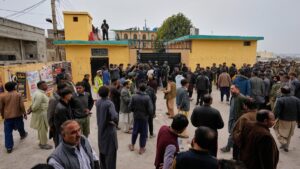Diplomacy vs. Military Might: Can Negotiations Prevent the Next Global Conflict?

By| Farooq Ahmad Lone
Foreign policy is what you do, and diplomacy is how you do it,” A famous quote underscores the strong connection between a nation’s foreign policy goals and the means by which they are achieved—primarily through diplomacy or, in more extreme cases, war. Foreign policy refers to the strategic objectives a nation pursues to increase its power and achieve its geopolitical ambitions. In this context, both war and diplomacy are tools used to accomplish these goals.
War, often seen as the continuation of politics by other means, tends to result in loss of life and destruction on both sides. It is generally difficult to achieve a nation’s interests solely through warfare, which is why diplomacy is usually preferred at the international level. The principle of diplomacy involves resolving disputes through peaceful means, a method that is highly encouraged over the option of war, which is often regarded as unnecessary and undesirable, especially in today’s so-called “civilized” world.
Yet, one must consider whether war is simply a failure of diplomacy or if diplomacy, in its practice, sometimes inadvertently leads to conflict. Some argue that diplomatic tactics can lead to failure, which might escalate into war. The use of military threats within diplomacy is sometimes seen as effective, yielding results that might not have been possible through negotiation alone. Powerful nations often use their military strength to coerce less powerful states into adopting certain foreign policies or positions.
During the Cold War, both the U.S. and the USSR used their military might to force alliances and influence outcomes. Today, countries like China, Turkey, and Israel are increasingly strengthening their military technologies, not just to enhance their defense capabilities but also to increase their diplomatic leverage. For instance, a powerful military can sometimes elevate a nation’s influence in international negotiations, enabling them to pursue their foreign policy goals more effectively.
In the modern era, nations like Russia, which continues to advance its military capabilities, demonstrate how military power is not just for defense but also to secure diplomatic influence. Similarly, in regions like South Asia, countries such as India and Pakistan, both nuclear-armed, are involved in an arms race to not only dominate militarily but also to increase their diplomatic leverage.
A nation’s nuclear capabilities can be a game-changer in diplomacy. The mere threat of military action or the use of nuclear weapons can force a non-nuclear state to adjust its policies. For example, the U.S. often threatens Iran with military action, including the possibility of nuclear strikes, as a way to achieve certain diplomatic objectives.
Ultimately, the key takeaway is that diplomacy, while a valuable tool for peaceful negotiation, is increasingly interlinked with military might. The boundaries between diplomacy and warfare are often blurred, with military power becoming an integral part of diplomatic strategy, whether it’s to intimidate, coerce, or negotiate better terms on the global stage. This complex relationship between diplomacy and military power reflects the evolving nature of international relations in the 21st century.
Author: Farooq Ahmad Lone, writes on International relations , and can been reached at ( lonefarooqahmad80@gmail.com)






